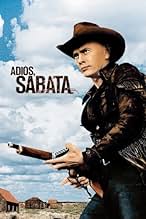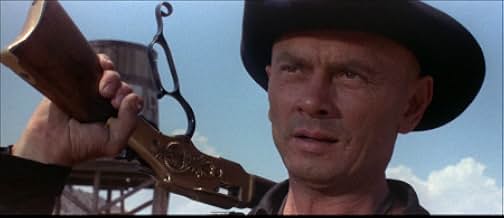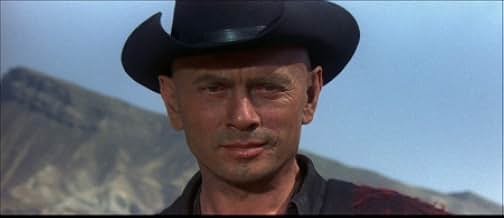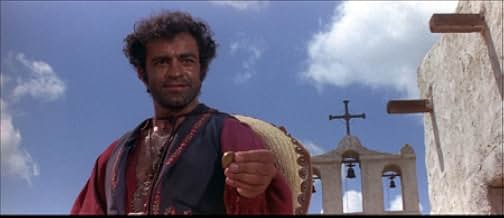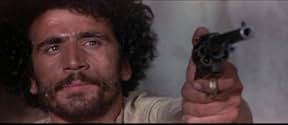Sabata Adeus
Título original: Indio Black, sai che ti dico: Sei un gran figlio di...
AVALIAÇÃO DA IMDb
5,9/10
2,5 mil
SUA AVALIAÇÃO
Adicionar um enredo no seu idiomaSabata helps a band of Mexican revolutionaries steal a wagon-load of gold from the occupying Austrian forces of Emperor Maximilian I.Sabata helps a band of Mexican revolutionaries steal a wagon-load of gold from the occupying Austrian forces of Emperor Maximilian I.Sabata helps a band of Mexican revolutionaries steal a wagon-load of gold from the occupying Austrian forces of Emperor Maximilian I.
- Direção
- Roteiristas
- Artistas
Ignazio Spalla
- Escudo
- (as Pedro Sanchez)
Gérard Herter
- Colonel Skimmel
- (as Gerard Herter)
Turam Quibo
- Gitano
- (as Joseph Persaud)
Nieves Navarro
- Kingsville Saloon Dancer
- (as Susan Scott)
Vittorio Caronia
- 1st Lt. Steiner
- (as Vitti Caronia)
Avaliações em destaque
Ok so it was supposed to be called INDIO BLACK as well as it should have been.
After all, Yul Brynner played the character far differently than Lee Van Cleef did and this film really shouldn't be associated with the other two Sabata films. It's a different character look altogether with the Brynner version dressed in black buckskin and silver buckles while the Van Cleef version of Sabata settled more for the conservative Bret Maverick gambler look.
Also notably stars failed American singer Dean Reed who would later die under mysterious circumstances in East Germany during the 1980s.
The Bruno Nicolai score is excellent although derivative of other scores for the genre. If you like soundtracks for these types of films, then it's well worth picking up. I know I'll be on the lookout for it.
Lots of explosions and gunfire in this one as Brynner & Co. battle the Austrians under Maximillian (in Mexico circa 1867) and steal their gold. There's nothing boring about it and it's face-paced with a few tricks such as the model of the ship in Colonel Skimmel's study that shoots real live ammo everytime someone opens the drawer below it. I also like Brynner's sawed-off rifle with the clip that loads from the side. He keeps a cigar in the last chamber and lights it up after every gun battle. Very tongue-in-cheek.
I liked it. Too bad the widescreen version was cropped for television.
6 out of 10
After all, Yul Brynner played the character far differently than Lee Van Cleef did and this film really shouldn't be associated with the other two Sabata films. It's a different character look altogether with the Brynner version dressed in black buckskin and silver buckles while the Van Cleef version of Sabata settled more for the conservative Bret Maverick gambler look.
Also notably stars failed American singer Dean Reed who would later die under mysterious circumstances in East Germany during the 1980s.
The Bruno Nicolai score is excellent although derivative of other scores for the genre. If you like soundtracks for these types of films, then it's well worth picking up. I know I'll be on the lookout for it.
Lots of explosions and gunfire in this one as Brynner & Co. battle the Austrians under Maximillian (in Mexico circa 1867) and steal their gold. There's nothing boring about it and it's face-paced with a few tricks such as the model of the ship in Colonel Skimmel's study that shoots real live ammo everytime someone opens the drawer below it. I also like Brynner's sawed-off rifle with the clip that loads from the side. He keeps a cigar in the last chamber and lights it up after every gun battle. Very tongue-in-cheek.
I liked it. Too bad the widescreen version was cropped for television.
6 out of 10
Yul Brynner and Dean (The Red Elvis) Reed team up with a group of Mexican revolutionaries in order to steal a shipment of gold belonging to the invading Austrian army and use it to buy guns for the resistance. However, the vicious Austrian occupiers have a few tricks up their sleeves and so does Brynner.
Yul's only real spaghetti western, his performance, flamboyant outfit, and neat gun-play elevates this very much typical, though well-made production to a higher level than it otherwise would have been. It's still too bland though.
The score by frequent Ennio Morricone collaborator Bruno Nicolai is pretty good.
From the producers and director of the earlier Sabata, this similarly themed film only became a sequel in the dubbing booth.
Yul's only real spaghetti western, his performance, flamboyant outfit, and neat gun-play elevates this very much typical, though well-made production to a higher level than it otherwise would have been. It's still too bland though.
The score by frequent Ennio Morricone collaborator Bruno Nicolai is pretty good.
From the producers and director of the earlier Sabata, this similarly themed film only became a sequel in the dubbing booth.
In his one and only venture into the pasta western, Yul Brynner finds himself succeeding Lee Van Cleef as the mysterious gunfighter Sabata who gets himself involved in Mexican politics in trying to overthrow the Emperor Maximilian. There hasn't been a film yet where the Juaristas aren't the good guys, even in Juarez where Brian Aherne made a sympathetic if somewhat naive Maximilian. It's such a clear case of imperialism.
But Yul isn't a total good guy and he teams up with three partners to steal a shipment of gold from the occupiers and give it to the Juaristas ostensibly. Actually the four of them are only as good as they have to be. And they've got another along, an American played by the only American actor in Adios Sabata, Dean Reed, who has an agenda all his own who keeps a positively explosive diary.
As most of us know even those who get their history from films, the Emperor Maximilian was an Austrian, but who was put on the newly created Mexican throne by the French and sustained by the French army. But here we have Austrian occupiers including an Austrian commander who also has a private agenda. I'm betting the producers were thinking that German types make so much better villains than the French.
Sabata's distinguishing characteristic was a rife that he had a long holster for and drew like a revolver. This rife had a unique horizontal magazine from where the bullets came. But the last chamber always had a cigar which Yul would light up after a killing well done.
I'm not a fan of spaghetti westerns and don't usually give them good reviews. It's the American genre and should be done by Americans. This one is no exception. But I will say that Yul Brynner's cynical look throughout the film is quite priceless.
But Yul isn't a total good guy and he teams up with three partners to steal a shipment of gold from the occupiers and give it to the Juaristas ostensibly. Actually the four of them are only as good as they have to be. And they've got another along, an American played by the only American actor in Adios Sabata, Dean Reed, who has an agenda all his own who keeps a positively explosive diary.
As most of us know even those who get their history from films, the Emperor Maximilian was an Austrian, but who was put on the newly created Mexican throne by the French and sustained by the French army. But here we have Austrian occupiers including an Austrian commander who also has a private agenda. I'm betting the producers were thinking that German types make so much better villains than the French.
Sabata's distinguishing characteristic was a rife that he had a long holster for and drew like a revolver. This rife had a unique horizontal magazine from where the bullets came. But the last chamber always had a cigar which Yul would light up after a killing well done.
I'm not a fan of spaghetti westerns and don't usually give them good reviews. It's the American genre and should be done by Americans. This one is no exception. But I will say that Yul Brynner's cynical look throughout the film is quite priceless.
Long before the Terminator, Sabata (this time Yul Brynner in his only spaghetti western) uttered the infamous words, "I'll be back." This is the second of Gianfranco Parolini's Sabata trilogy, but it is not a sequel, as the characters and story are different. Like the first, it is also written by Renato Izzo, who went on to write the video nasty Night Train Murders after finishing the trilogy.
Brynner had the cool look that probably got him the Westworld gig a few years later.
Ignazio Spalla is back from the fist film, but with a different name (Escudo). Maybe he changed it to hide.
Sabata joins Escudo and revolutionaries trying to overthrow Austrian Archduke Maximillion, who ruled over Mexico as an imperial dictator; of course, Sabata was only after gold. Others were as well, so it was not a walk in the park.
It is fortunate that the Archduke had plenty of soldiers to sacrifice to the cause.
Well, Lee Van Cleef, Ignazio Spalla, and Aldo Canti will be back in the final Sabata film.
Brynner had the cool look that probably got him the Westworld gig a few years later.
Ignazio Spalla is back from the fist film, but with a different name (Escudo). Maybe he changed it to hide.
Sabata joins Escudo and revolutionaries trying to overthrow Austrian Archduke Maximillion, who ruled over Mexico as an imperial dictator; of course, Sabata was only after gold. Others were as well, so it was not a walk in the park.
It is fortunate that the Archduke had plenty of soldiers to sacrifice to the cause.
Well, Lee Van Cleef, Ignazio Spalla, and Aldo Canti will be back in the final Sabata film.
Firstly, this is *not* a sequel to 1970's "Sabata" ("Ehi amico... c'è Sabata, hai chiuso!") although it can be considered a follow up of sorts. Lee Van Cleef did not reprise the role until 1971's "Return of Sabata". "Adiós Sabata" was originally about a character called Indio Black and completely unrelated to the previous Sabata story - Indio, I believe, was meant to be nothing more than a bandit. The name was changed to cash in on the success of "Sabata" - though this film could be considered a true Sabata entry as a couple of stars return (Pedro Sanchez, Gianni Rizzo) and the screenwriters and director are the same. Gianfranco Parolini (Frank Kramer) perhaps out does the previous film here, keeping everything tighter - "Sabata" was a little too jokey (although still excellent and one of the truly great Italian westerns) whereas this is blatantly tongue in cheek. I feel the music is better in this film, never intrusive and always fitting: a triumph for Bruno Nicolai, despite the fact that it is incredibly reminiscent of Morricone.
As Sabata, Brynner is a kind of anti-hero counterpart to Chris from "The Magnificent Seven"; he even dresses out all in black here too. Gérard Herter is great as the Austrian Colonel Skimmel at the time of Emperor Maximillian's Mexico - a kind of borderline camp, Bond villain type, complete with monacle and perfectly trimmed moustache. Oh, and yes, he is a dead shot with a rifle. In "Sabata", Franco Ressel's Stengel had his shootout's behind man shaped shields (to live at the peak of danger or some such nonsense) as his playtoy; Herter's Skimmel has an even better one - a drawer beneath a model ship that when opened fires each cannon on the model directly into whoever opens the drawer. Like "The Good, the Bad and the Ugly" (which this film contains some surprisingly subtle references to) the plot centres around a shipment of gold: Sabata, Escudo (Sanchez) and Ballantine (Dean Reed) want the wagon load of gold, but it is also coveted by Maximillian's rebels. The scenes with the gold and the gold dust being poured out/spilled is nicely complimented by Nicolai's incidental music which really does bring out the joy of the characters.
I personally think it's a shame that Brynner and the others weren't brought back for another Sabata film because he plays the role much straighter than Van Cleef did and really does come across as a tough guy here, who doesn't need to rely on his gun. "Adiós Sabata" is a classic in it's own right and doesn't need to be viewed with the other Sabata entries. It's only downside is that after surpassing the superb original, it left most people disappointed with the later "Return of Sabata".
Are these subtle hints to Leone's 1966 masterpiece? Sanchez: "Me, I'd make a hiding place no-one would find - stick it in the ground, maybe in a cemetery..." Reed (the last line): "Hey fellas - are you gonna help me pick up the gold or not, you sons of...!" (music takes over)
As Sabata, Brynner is a kind of anti-hero counterpart to Chris from "The Magnificent Seven"; he even dresses out all in black here too. Gérard Herter is great as the Austrian Colonel Skimmel at the time of Emperor Maximillian's Mexico - a kind of borderline camp, Bond villain type, complete with monacle and perfectly trimmed moustache. Oh, and yes, he is a dead shot with a rifle. In "Sabata", Franco Ressel's Stengel had his shootout's behind man shaped shields (to live at the peak of danger or some such nonsense) as his playtoy; Herter's Skimmel has an even better one - a drawer beneath a model ship that when opened fires each cannon on the model directly into whoever opens the drawer. Like "The Good, the Bad and the Ugly" (which this film contains some surprisingly subtle references to) the plot centres around a shipment of gold: Sabata, Escudo (Sanchez) and Ballantine (Dean Reed) want the wagon load of gold, but it is also coveted by Maximillian's rebels. The scenes with the gold and the gold dust being poured out/spilled is nicely complimented by Nicolai's incidental music which really does bring out the joy of the characters.
I personally think it's a shame that Brynner and the others weren't brought back for another Sabata film because he plays the role much straighter than Van Cleef did and really does come across as a tough guy here, who doesn't need to rely on his gun. "Adiós Sabata" is a classic in it's own right and doesn't need to be viewed with the other Sabata entries. It's only downside is that after surpassing the superb original, it left most people disappointed with the later "Return of Sabata".
Are these subtle hints to Leone's 1966 masterpiece? Sanchez: "Me, I'd make a hiding place no-one would find - stick it in the ground, maybe in a cemetery..." Reed (the last line): "Hey fellas - are you gonna help me pick up the gold or not, you sons of...!" (music takes over)
Você sabia?
- CuriosidadesThis was not originally a Sabata film. The original Italian title translates as "Indio Black, you know what? You're a big son of a...", Indio Black being the character played by Yul Brynner, but the title and Brynner's character name were changed for the American release to cash in on Sabata, o Homem que Veio para Matar (1969), the original Sabata film. Lee Van Cleef was asked to star in this film, but rejected the offer for some reason. He was then replaced by Brynner, whose character would only be called Sabata in the international English language version, and Indio Black in the Italian version. However, lip reading viewers have noticed that the actors who mouth their lines in English, seem to say "Sabata", not "Indio", so the re-baptism took place while the film was still being shot.
- Erros de gravaçãoWhen Sabata invades Colonel Skimmel's quarters, he sees the reflection of a person hiding behind the door. The person in the reflection is not Hertz.
- ConexõesEdited into Spaghetti Western Trailer Show (2007)
Principais escolhas
Faça login para avaliar e ver a lista de recomendações personalizadas
- How long is Adiós, Sabata?Fornecido pela Alexa
- What type of weapon did Yul use in this movie?
Detalhes
Bilheteria
- Faturamento bruto nos EUA e Canadá
- US$ 546.926
- Tempo de duração1 hora 44 minutos
- Proporção
- 2.35 : 1
Contribua para esta página
Sugerir uma alteração ou adicionar conteúdo ausente

Principal brecha
By what name was Sabata Adeus (1970) officially released in India in English?
Responda

